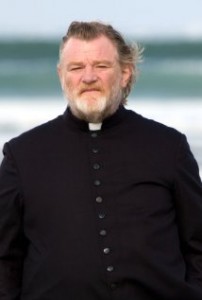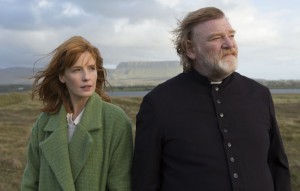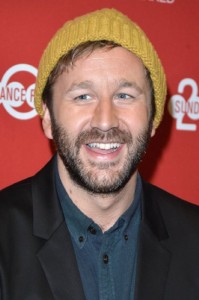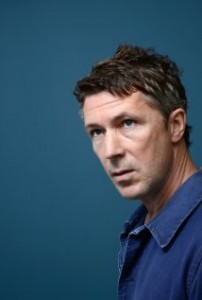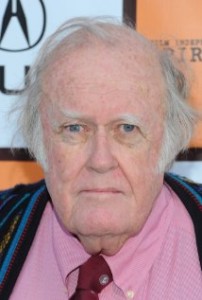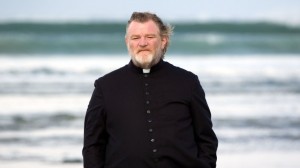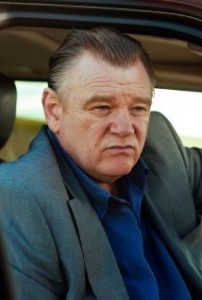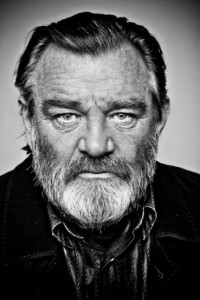Calvary (2014, Brendan Gleeson) – Movie Review
Calvary is a mixed blessing. On the one hand we have Brendan Gleeson’s magnificent, layered, textured performance as an Irish priest, Father James Lavelle, an unequivocally good, wise man in a flawed, mad world full of idiots. We have a provocative situation, a serious, meaty subject to chew over, some good, big laughs, some dark doings and a decent thriller plot. Gleeson involves you in all this, forces you to watch and care. It’s a serious, intelligent film for grown-ups, with some wickedly funny black comedy, and demands to be seen just for that.
On the other hand, we have a bunch of cardboard stereotype caricatures instead of characters, giving a variable bunch of actors a hard time, even the best of them, and a variable script that mixes good lines with weak ones, good ideas with weak ones, and doesn’t make either the thriller or the religious discussion fresh, original or exciting. At heart it’s a bunch of rather obvious statements and random thoughts about life, not well thought-through or developed or properly digested. It’s middling quality meat, carefully marinaded and stirred up into a semi-hot stew with a lot of high-grade seasoning.
Writer/director John Michael McDonagh’s flawed screenplay starts before the title with Father James given a death sentence in the confessional by an unknown voice. The would-be assassin plans a rendezvous with him on a lonely beach on the following Sunday, giving Father James a week to get his act together and say his final prayers. The voice says he was raped by a priest at seven, that priest is dead, so Father James must pay with his life. That logic doesn’t make a scrap of sense, but then it’s the logic of a loony.
The identity of the killer comes as zero surprise to anyone who’s watched a single episode of Poirot, Morse or Marple. Then again, there’s no police inspector or Vatican investigator, and we don’t think much about this thriller plot again till the movie’s rather anti-climactic climax. Instead a lot of other vaguely menacing, then actually threatening things happen. Father James’s parishioners, his dog and even his church are in danger. It’s a pretty busy damned week for the Father. So bad that it understandably drives him back to the swearing and the bottle, as well as, less comprehendably, waving a gun around.
Aidan Gillen as a hospital working coke-snorting doctor, Domhnall Gleeson (Brendan’s son) as a jailed killer, Chris O’Dowd as a local loose cannon, a racist butcher who may be beating up his mistress and others try very hard with their caricatures, and do make some impression.
But, with its self-referential talk of third acts and characters built into the script, and even a character who is a writer (nice to see M. Emmet Walsh again, as always), it’s all a lofty writer’s contrivance. It’s hard to believe a word of it. But, then again, you don’t have to in order to appreciate it. It’s like going to church. First, you just have to be there on Sunday.
McDonagh’s writing for his female characters is especially weak, making them look worse actors than they really are. This gives Kelly Reilly, with a large, key role as Father James’s estranged daughter, a really hard time. Even so, one or two of the male characters are even worse written. Dylan Moran’s rich landlord Michael Fitzgerald is a terrible creation, embarrassingly bad, and the Irish comedian can’t make it funny or involving.
An internet headline says Calvary is ‘A witty, moving and poetic Irish western’. It’s absolutely none of these things. And if it’s ‘part Father Ted and part Tarantino’, it’s nine parts Ted and one part Quentin. Actually, it’s one part Hitchcock’s I Confess, too. McDonagh previously worked on The Guard (2011) with Gleeson, which simply is a more successful achievement. Overall, though, Calvary’s got a lot going for it – Gleeson, meaty subject, big laughs – and it’s definitely one to see. One thumb up.
McDonagh conceived the idea for Calvary and wrote the screenplay while filming The Guard in late 2009. McDonagh explains: ‘There are probably films in development about priests which involve abuse. My remit is to do the opposite of what other people do, and I wanted to make a film about a good priest.’ He says it is ‘in the same darkly comedic vein as The Guard, but with a much more serious and dramatic narrative.’
McDonagh spent three weeks shooting in and around County Sligo, with some shooting in Ardgillan Castle, Balbriggan, Dublin, followed by two weeks of filming in Rush, Dublin.
http://derekwinnert.com/i-confess-classic-film-review-447/
(C) Derek Winnert 2014
Link to Derek Winnert’s home page for more film reviews: http://derekwinnert.com/

